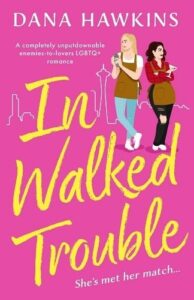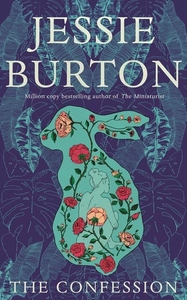Buy this from Bookshop.org to support local bookstores and the Lesbrary!
In Walked Trouble, Dana Hawkins’s newest novel, takes us away from the coffee shop of Not in the Plan and into Nueve’s, a Puerto Rican bar and restaurant that should totally exist. (Has anyone else noticed just how many great concepts for restaurants, bars, coffee shops, bookstores, films, TV series, etc. that exist in romance novels?) Remi James is briefly introduced in Not in the Plan, but all anyone really needs to know about this character becomes clear in the first chapter of In Walked Trouble—Remi is definitely on the surly side of the personality spectrum.
A grump, if you will.
Despite her grumpy nature, everything seems to be coming up Remi: her boss has called her in to discuss what must be the promotion that she so rightly deserves. Having grown up in the foster system, Remi is obsessed with the idea that a house will make a home for her, but she needs more money for a downpayment. Money she will earn when she finally gets that promotion to head bartender. Which is why she’s so angry when she discovers that her boss has brought in Maya to co-bartend with Remi. No promotion, no raise. Remi’s attraction to Maya is immediately replaced with anger. (“Replaced” is a strong word—let’s say “supplemented by” instead.) To make matters worse, the money that would have gone into that raise is now being offered as a bonus. May the best bartender win.
Remi thinks that this will be no problem because of how fast and efficient she is. What she doesn’t know is that Maya tosses bottles, which tends to make a bartender very popular very quickly. Maya, according to Remi, is “ready for a runway.” And she smiles too much.
Is there a better trope than grumpy/sunshine? Don’t bother answering that question—there isn’t.
Maya also needs that bonus to afford her master’s in nursing, a degree she’s pursuing in part because of her sister, who has type 1 diabetes. She is also grieving her father’s sudden death nine years earlier. As I’ve written many times before, I appreciate when a romance novel focuses on the trauma of the main character (or, in this case, both main characters). While two characters can’t fix the trauma that the other faces, they can listen, be supportive, and offer help when appropriate. Sure, the other stuff is pretty good as well, but I really enjoy this element of Remi and Maya’s relationship.
What other stuff? Well, if asked, I would point to a scene that involves mop water, ice cubes, a lemon slice, and dueling soda guns.
I could probably end this review here, right?
Back to trauma for a moment. If you’re the kind of romance reader who prefers the “don’t bore us, get to the chorus” approach, In Walked Trouble is probably not for you. Yes, there is instant chemistry between Remi and Maya, but the movement on that attraction only occurs after they actually get to know each other. Fine… there is also a lot of alcohol. But even that isn’t what you think it is. Hawkins puts together a narrative where it is not entirely clear whether the physical intimacy came before the emotional intimacy or vice versa. That sentence felt cringey as I wrote, but I’m sticking with it because of how strongly I value the whole “talking about feelings” thing. We know that it isn’t exactly easy to open up to other people in a genuine way, and I can’t help but think stories like this one model a better approach.
Hawkins does reinforce a few other concepts in In Walked Trouble, including one of my favorites: coming up with really bad excuses to be somewhere or to do something for someone. Because sometimes you’re not ready to talk about your feelings with someone, but you still want that someone to know that eventually you might want to. The really bad excuse approach to getting to know someone never gets old.
Neither does grumpy/sunshine.
(One more thing: I had no intention of comparing In Walked Trouble to a film like I did last month in my review of Cover Story… but then I read someone comparing In Walked Trouble to the 1988 Tom Cruise movie Cocktail. You know, the movie they show clips of during the “Kokomo” music video? And, okay, yes, Maya does toss bottles like Tom Cruise’s character. That is, and I cannot stress this enough, the only connection between this book and that movie. Seriously, don’t watch Cocktail thinking it’s a romcom. Watch it because a) it won the Golden Raspberry for Worst Movie and b) it goes way darker than any movie whose soundtrack features “Kokomo” has a right to do.)
Liv (she/her) is a trans woman, a professor of English, and a reluctant Southerner. Described (charitably) as passionate and strong-willed, she loves to talk (and talk) about popular culture, queer theory, utopias, time travel, and any other topic that she has magpied over the years. You can find her on storygraph and letterboxd @livvalentine.

